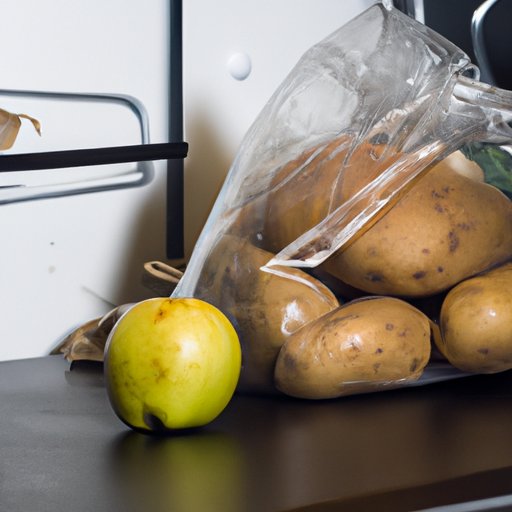Introduction
Potatoes are one of the most versatile and widely used ingredients in the world. They can be cooked in a variety of ways, from mashed and baked to fried and roasted. But before you can enjoy all the delicious dishes that potatoes can provide, you must know how to store them properly. In this article, we’ll cover the best way to store potatoes for long-term storage.
A potato is a starchy tuberous crop from the perennial nightshade Solanum tuberosum. It is the world’s fourth-largest food crop and is an important source of carbohydrates and vitamins. Potatoes are often stored for many weeks or months at a time, so it’s important to know the best way to store them.
When it comes to storing potatoes, there are several common problems that can arise. Potatoes can easily become soft and mushy if they are stored in too warm of an environment, while they can also become discolored and sprout if they are stored in too cold of an environment. Furthermore, potatoes should not be stored near apples, as the ethylene gas produced by apples can cause potatoes to spoil quickly.
Storing Potatoes in a Cool, Dark Place
The best way to store potatoes is in a cool, dark place. This means a temperature between 45 and 50 degrees Fahrenheit. Storing potatoes in a cool, dark place will help keep them fresh for longer and ensure that they don’t become soft and mushy. Here are some tips for finding the right storage space for your potatoes:
- Avoid storing potatoes in direct sunlight, as this can cause them to become discolored.
- Choose a spot in your kitchen or pantry that isn’t too close to a heat source, such as an oven or radiator.
- If you have an unheated basement, garage, or shed, these can make great storage spots, as long as they remain cool and dry.
Utilizing the Refrigerator for Long-Term Storage
If you want to store potatoes for longer than a few weeks, you may want to consider storing them in the refrigerator. This can help extend their shelf life and ensure that they stay fresh for up to eight weeks. However, there are a few things you should keep in mind when storing potatoes in the refrigerator:
- Make sure to use an appropriate storage container, such as a plastic bag, cardboard box, or airtight container.
- Do not wash potatoes before storing them in the refrigerator, as this can cause them to spoil more quickly.
- Be sure to check the potatoes regularly for signs of spoilage, such as softness, discoloration, or mold.

Keeping Potatoes Away from Apples
It’s important to keep potatoes away from apples, as the ethylene gas produced by apples can cause potatoes to spoil quickly. The best way to do this is to store them in separate containers or bags. Additionally, you should avoid storing potatoes near other fruits and vegetables that produce ethylene gas, such as bananas, pears, and tomatoes.
There are several advantages to separating apples and potatoes. For one, it helps reduce the risk of cross-contamination, which can lead to foodborne illnesses. Additionally, it reduces the amount of ethylene gas that gets trapped in the container or bag, which can help extend the shelf life of both apples and potatoes.

Using Paper or Mesh Bags to Store Potatoes
Paper and mesh bags are another great option for storing potatoes. These bags allow for air circulation, which helps prevent the potatoes from becoming soft and mushy. Additionally, paper and mesh bags are lightweight and easy to transport, making them a great choice for bringing potatoes to a picnic or potluck.
When choosing a paper or mesh bag for storing potatoes, it’s important to select one that is large enough to accommodate the amount of potatoes you plan to store. Additionally, make sure to choose a bag that is made from breathable material, such as cotton or jute. Finally, be sure to check the bag regularly for signs of wear and tear, as this can affect the longevity of your potatoes.
Checking Potatoes Regularly for Signs of Spoilage
No matter how you decide to store your potatoes, it’s important to check them regularly for signs of spoilage. To do this, simply inspect each potato for any discoloration, softness, or mold. If you notice any of these signs, discard the affected potatoes immediately. Additionally, be sure to check the storage container or bag for any visible signs of damage, such as tears or holes.
Conclusion
Storing potatoes correctly is essential for ensuring they remain fresh and flavorful. The best way to store potatoes is in a cool, dark place, such as a kitchen pantry or unheated basement. Additionally, you can store potatoes in the refrigerator for up to eight weeks, although you should use an appropriate storage container and check them regularly for signs of spoilage. Finally, make sure to keep potatoes away from apples and other fruits and vegetables that produce ethylene gas, and consider using paper or mesh bags for extra ventilation.


